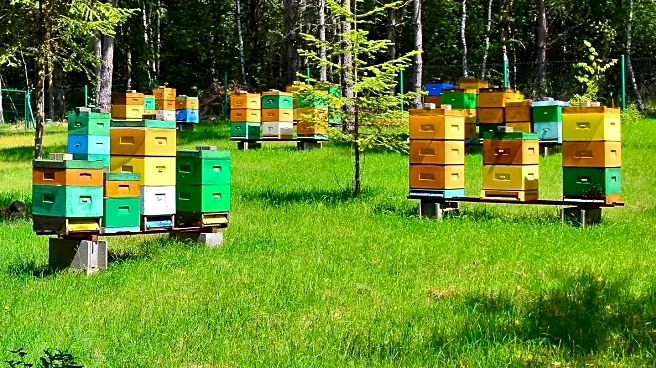What's Happening?
Hotels are increasingly incorporating bee hotels as part of their sustainability initiatives. These structures provide nesting spaces for solitary bee species, which are crucial for pollinating native plants and maintaining biodiversity. Unlike the more commonly known honey bees, solitary bees are specialist pollinators that support specific plant species, contributing to environmental resilience. The installation of bee hotels is a low-cost method for hotels to engage in eco-friendly practices, appealing to environmentally conscious travelers. Additionally, some hotels are placing beehives on rooftops to produce local honey, enhancing the dining experience by offering unique flavors that guests cannot find elsewhere.
Why It's Important?
The introduction of bee hotels and rooftop beehives in hotels represents a significant step towards environmental sustainability. By supporting solitary bee species, hotels contribute to the preservation of native plant biodiversity, which is essential for healthy ecosystems. This initiative not only aids in combating the effects of human-induced environmental changes but also aligns with the growing consumer demand for eco-conscious travel options. Hotels that adopt these practices can improve their brand reputation and attract guests who prioritize sustainability. Furthermore, offering locally produced honey can enhance the culinary experience, providing a unique selling point that differentiates these hotels from competitors.
What's Next?
As more hotels recognize the benefits of bee hotels and rooftop beehives, it is likely that these practices will become more widespread. Hotels may explore additional ways to integrate sustainability into their operations, such as expanding horticulture programs or collaborating with local environmental organizations. The positive reception from guests could encourage other industries to adopt similar eco-friendly practices, potentially leading to broader environmental impacts. Stakeholders, including hotel management and environmental groups, may continue to advocate for increased biodiversity and sustainability measures within the hospitality sector.
Beyond the Headlines
The use of bee hotels highlights the importance of supporting all bee species, not just honey bees, for ecosystem health. This approach underscores the need for a balanced strategy in environmental conservation, where both generalist and specialist pollinators are valued. The initiative also reflects a shift in consumer behavior, where travelers are increasingly 'voting with their wallets' for sustainable options. This trend could drive long-term changes in the hospitality industry, encouraging more businesses to adopt environmentally friendly practices.










